学术英语社科Unit2二单元原文及翻译
学术英语(社科)Unit1-8 Text A译文
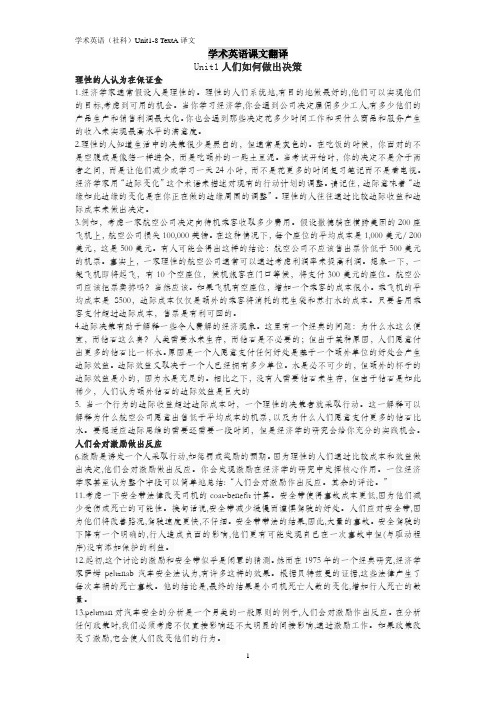
学术英语课文翻译Unit1人们如何做出决策理性的人认为在保证金1.经济学家通常假设人是理性的。
理性的人们系统地,有目的地做最好的,他们可以实现他们的目标,考虑到可用的机会。
当你学习经济学,你会遇到公司决定雇佣多少工人,有多少他们的产品生产和销售利润最大化。
你也会遇到那些决定花多少时间工作和买什么商品和服务产生的收入来实现最高水平的满意度。
2.理性的人知道生活中的决策很少是黑白的,但通常是灰色的。
在吃饭的时候,你面对的不是空腹或是像猪一样进食,而是吃额外的一匙土豆泥。
当考试开始时,你的决定不是介于两者之间,而是让他们减少或学习一天24小时,而不是花更多的时间复习笔记而不是看电视。
经济学家用“边际变化”这个术语来描述对现有的行动计划的调整。
请记住,边际意味着“边缘如此边缘的变化是在你正在做的边缘周围的调整”。
理性的人往往通过比较边际收益和边际成本来做出决定。
3.例如,考虑一家航空公司决定向待机乘客收取多少费用。
假设撒德躺在横跨美国的200座飞机上,航空公司损失100,000英镑。
在这种情况下,每个座位的平均成本是1,000美元/ 200美元,这是500美元。
有人可能会得出这样的结论:航空公司不应该售出票价低于500美元的机票。
事实上,一家理性的航空公司通常可以通过考虑利润率来提高利润。
想象一下,一架飞机即将起飞,有10个空座位,候机旅客在门口等候,将支付300美元的座位。
航空公司应该把票卖掉吗?当然应该。
如果飞机有空座位,增加一个乘客的成本很小。
乘飞机的平均成本是S500,边际成本仅仅是额外的乘客将消耗的花生袋和苏打水的成本。
只要备用乘客支付超过边际成本,售票是有利可图的。
4.边际决策有助于解释一些令人费解的经济现象。
这里有一个经典的问题:为什么水这么便宜,而钻石这么贵?人类需要水来生存,而钻石是不必要的;但出于某种原因,人们愿意付出更多的钻石比一杯水。
原因是一个人愿意支付任何好处是基于一个额外单位的好处会产生边际效益。
学术英语(社科)-Unit-2含答案

Unit 2
Economics
Text A
English language for academic purpose
Signpost language
cause and effect: clue words to indicate cause and effect:
because the reason lead to, result from is due to
Former President of the United States Journalist
Chief Executive Officer, Microsoft
Singer for the Rolling Stones
Unit 2
Economics
• Text A
–Critical reading and thinking – Difficult sentences – English language for
Unit 2
Economics
Text A
English language for academic purpose
Specialized vocabulary
elasticity
(__需_求__等_的_)__弹_性_
comparative advantage __比_较__优_势_____
consumer surplus __消__费_过_剩_________
→ Yet, although the models are not exactly the same as real bodies – actually just because they are not that realistic – they are useful to help people learn how the human body works.
学术英语-综合-第二单元
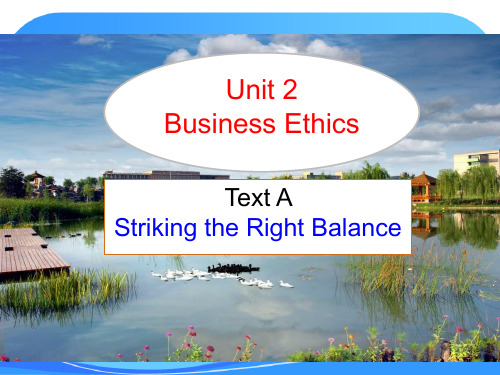
▪ Profit maximization is the right goal for a business---- Adam Smith
2016年3·15晚会:共筑消费新生态
▪ 【曝光】“饿了么”惊现黑心作坊 看完你还会饿 么?
▪ 【曝光】制造用废钢料 这样的假牙你敢戴吗? ▪ 【权威发布】跨境电商进口儿童用品超三成不合
Stakeholder VS Shareholder
▪ There are two schools of thought regarding how companies should approach a definition for business ethics: the shareholder perspective and the stakeholder perspective.
Stakeholder VS Shareholder
▪ Shareholder Perspective ▪ Those who approach ethical decision making from
a shareholder perspective focus on making decisions that are in the owners' best interest. Decisions are guided by a need to maximize return on investment for the organization's shareholders. Individuals who approach ethics from this perspective feel that ethical business practices are ones that make the most money.
学术英语(社科)听力原文及翻译

学术英语(社科)听力原文及翻译1. Unit 1Businesses are structured in different ways to meet different needs. The simplest form of business is called an individual or sole proprietorship. The proprietor(经营者) owns all of the property of the business and is responsible for everything.For legal purposes, with this kind of business, the owner and the company are the same. This means that the proprietor gets to keep all of the profits of the business, but also must pay any debts. Another kind of business is the partnership. Two or more people go into business together. An agreement is usually needed to decide how much of the partnership each person controls.One kind of partnership is called a limited liability partnership. These have full partners and limited partners. Limited partners may not share as much in the profits, but they also have less responsibilities for the business.Doctors, lawyers and accountants often form partnerships to share their risks and profits. A husband and wife can form a business partnership together.Partnerships exist only for as long as the owners remain alive. The same is true of individual proprietorships.But corporations are designed to have an unlimited lifetime. A corporation is the most complex kind of business organization. Corporations can sell stock as a way to raise money. Stock represents shares of ownership in a company. Investors who buystock can trade their shares or keep them as long as the company is in business.A company might use some of its earnings to pay dividends(红利) as a reward to shareholders. Or the company might reinvest the money into the business.If shares lose value, investors can lose all of the money they paid for their stock. But shareholders are not responsible for the debts of the corporation.A corporation is recognized as an entity(实体)——its own legal being, separate from its owners.A board of directors control corporate policies. The directors appoint top company officers. The directors might or might not hold shares in the corporation.If shares lose value, investors can lose all of the money they paid for their stock.But not all corporations are traditional businesses that sell stock. Some nonprofit groups are also organized as corporations.2. Unit 2In the past three week I have introduced you to the ideas and methods of economics.In the next week, we will start learning more, in more detail the principles of economic behavior and economic policy.As you proceed through the whole semester, you will be asked to draw on many of your intellectual skills.在过去的三周里,我向你介绍了经济学的思想和方法。
学术英语综合第二单元

自由企业制度,就是确保企业能够拥有在产权受法律保护的基础上所 享有的自由创业权、自由经营权、自由交易权以及自由支配或处置财 产权等一系列的制度安排。它包括产权制度、进入退出制度、公平竞 争制度、平等合约制度、平等交易制度以及平等获取信息服务制度等。
Do you agree or not?
格 ▪ 【消费预警】你买的人参可能一半是白糖!
Balance profit and business ethics
Business Ethics
▪ Business ethics means written and unwritten codes of moral standards that are critical to the current activities and future aspirations of a business organization. They can differ from one company to another because of differences in cultural perspectives, operational structures and strategic orientations. The guiding framework of business ethics exists all levels of the organization. It is about having the wisdom to determine the difference between right actions and wrong decisions.
▪ Profit maximization is the right goal for a business---- Adam Smith
学术英语原文2单元
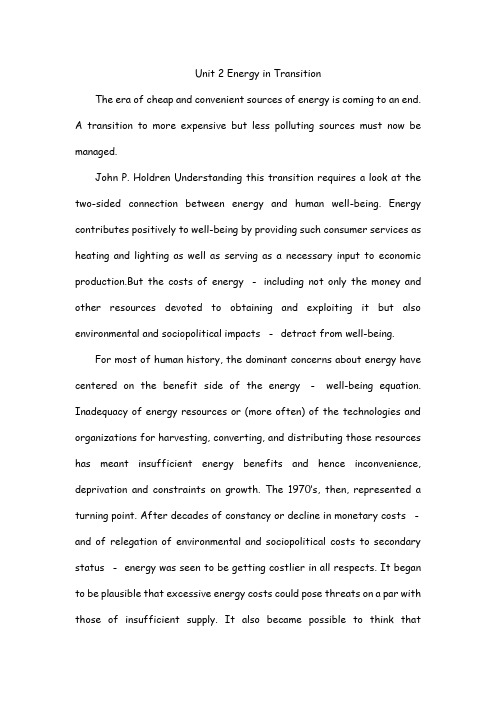
Unit 2 Energy in TransitionThe era of cheap and convenient sources of energy is coming to an end.A transition to more expensive but less polluting sources must now be managed.John P. HoldrenUnderstanding this transition requires a look at the two-sided connection between energy and human well-being. Energy contributes positively to well-being by providing such consumer services as heating and lighting as well as serving as a necessary input to economic production.But the costs of energy -including not only the money and other resources devoted to obtaining and exploiting it but also environmental and sociopolitical impacts -detract from well-being.For most of human history, the dominant concerns about energy have centered on the benefit side of the energy -well-being equation. Inadequacy of energy resources or (more often) of the technologies and organizations for harvesting, converting, and distributing those resources has meant insufficient energy benefits and hence inconvenience, deprivation and co nstraints on growth. The 1970’s, then, represented a turning point. After decades of constancy or decline in monetary costs -and of relegation of environmental and sociopolitical costs to secondary status -energy was seen to be getting costlier in all respects. It began to be plausible that excessive energy costs could pose threats on a par with those of insufficient supply. It also became possible to think thatexpanding some forms of energy supply could create costs exceeding the benefits.The crucial q uestion at the beginning of the 1990’s is whether the trend that began in the 1970’s will prove to be temporary or permanent. Is the era of cheap energy really over, or will a combination of new resources, new technology and changing geopolitics bring it back? One key determinant of the answer is the staggering scale ofenergy demand brought forth by 100 years of unprecedented population growth, coupled with an equally remarkable growth in per capita demand of industrial energy forms. It entailed the use of dirty coal as well as clean; undersea oil as well as terrestrial; deep gas as well as shallow; mediocre hydroelectric sites as well as good ones; and deforestation as well as sustainable fuelwood harvesting.Except for the huge pool of oil underlying the Middle East, the cheapest oil and gas are already gone. Even if a few more giant oil fields are discovered, they will make little difference against consumption on today’s scale. Oil and gas will have to come increasingly, for most countries, from deeper in the earth and from imports whose reliability and affordability cannot be guaranteed.There are a variety of other energy resources that are more abundant than oil and gas. Coal, solar energy, and fission and fusion fuels are the most important ones. But they all require elaborate and expensivetransformation into electricity or liquid fuels in order to meet society’s needs. None has very good prospects for delivering large quantities of electricity at costs comparable to those of the cheap coal-fired and hydropower plants of the 1960’s. It appears, then, that expensive energy is a permanent condition, even without allowing for its environmental costs.The capacity of the environment to absorb the effluents and other impacts of energy technologies is itself a finite resource. The finitude is manifested in two basic types of environmental costs. External costs are those imposed by environmental disruptions on society but not reflected in the monetary accounts of the buyers and sellers of the energy. “Internalized costs” are increases in monetary costs imposed by measures, such as pollution-control devices, aimed at reducing the external costs.Both types of environmental costs have been rising for several reasons. First, the declining quality of fuel deposits and energy-conversion sites to which society must now turn means more material must be moved or processed, bigger facilities must be constructed and longer distances must be traversed. Second, the growing magnitude of effluents from energy systems has led to saturation of the environment’s capacity to absorb such effluents without disruption. Third, the monetary costs of controlling pollution tend to increase with the percentage of pollutants removed.Despite these expenditures, the remaining uninternalized environmental costs have been substantial and in many cases are growing.Those of greatest concern are the risk of death or disease as a result of emissions or accidents at energy facilities and the impact of energy supplied on the global ecosystem and on international relations.The impacts of energy technologies on public health and safety are difficult to pin down with much confidence. In the case of air pollution from fossil fuels, in which the dominant threat to public health is thought to be particulates formed from sulfur dioxide emissions, a consensus on the number of deaths caused by exposure has proved impossible. Widely differing estimates result from different assumptions about fuel compositions, air pollution control technology, power-plant sitting in relation to population distribution, meteorological conditions affecting sulfate formation, and, above all, the relation between sulfate concentrations and disease.Large uncertainties also apply to the health and safety impacts of nuclear fission. In this case, differing estimates result in part from differences among sites and reactor types, in part from uncertainties about emissions from fuel-cycle steps that are not yet fully operational (especially fuel reprocessing and management of uranium-mill tailings) and in part from different assumptions about the effects of exposure to low-dose radiation. The biggest uncertainties, however, relate to the probabilities and consequences of large accidents at reactors, at reprocessing plants and in the transport of wastes.Altogether, the ranges of estimated hazards to public health from both coal-fired and nuclear-power plants are so wide as to extend from negligible to substantial in comparison with other risks to the population. There is little basis, in these ranges, for preferring one of these energy sources over the other. For both, the very size of the uncertainty is itself a significant liability.Often neglected, but no less important, is the public health menace from traditional fuels widely used for cooking and water heating in the developing world. Perhaps 80 percent of global exposure to particulate air pollution occurs indoors in developing countries, where the smoke from primitive stoves is heavily laden with dangerous hydrocarbons. A disproportionate share of this burden is borne, moreover, by women (who do the cooking) and small children (who indoors with their mothers).The ecological threats posed by energy supply are even harder to quantify than the threats to human health and safety from effluents and accidents. Nevertheless, enough is known to suggest they portend even larger damage to human well-being. This damage potential arises from the combination of two circumstances.First, civilization depends heavily on services provided by ecological and geophysical processes such as building and fertilizing soil, regulating water supply, controlling pests and pathogens, and maintaining a tolerable climate; yet it lacks the knowledge and the resources to replace nature’sservices with technology. Second, human activities are now clearly capable of disrupting globally the processes that provide these services. Energy supply, both industrial and traditional, is responsible for a striking share of the environmental impacts of human activity. The environmental transition of the past 100 years -driven above all by a 20-fold increase in fossil-fuel use and augmented by a tripling in the use of traditional energy forms -has amounted to no less than the emergence of civilization as a global ecological and geochemical force.Of all environmental problems, the most threatening, and in many respects the most intractable, is global climate change. And the greenhouse gases most responsible for the danger of rapid climate change come largely from human endeavors too massive, widespread and central to the functioning of our societies to be easily altered: carbon dioxide (CO2) from deforestation and the combustion of fossil fuels; methane from rice paddies, cattle gusts and the exploitation of oil and natural gas; and nitrous oxides from fuel combustions and fertilizer use.The only other external cost that might match the devastating impact of global climate change is the risk of causing or aggravating large-scale military conflict. One such threat is the potential for conflict over access to petroleum resources. Another threat is the link between nuclear energy and the spread of nuclear weapons. The issue is hardly less complex and controversial than the link between CO2 and climate; many analysts,including me, think it is threatening indeed.能源资源价格低廉、使用便捷的时代已经过去了,目前应向尽管价格较高、但污染较小的资源转变。
学术英语社科课文翻译
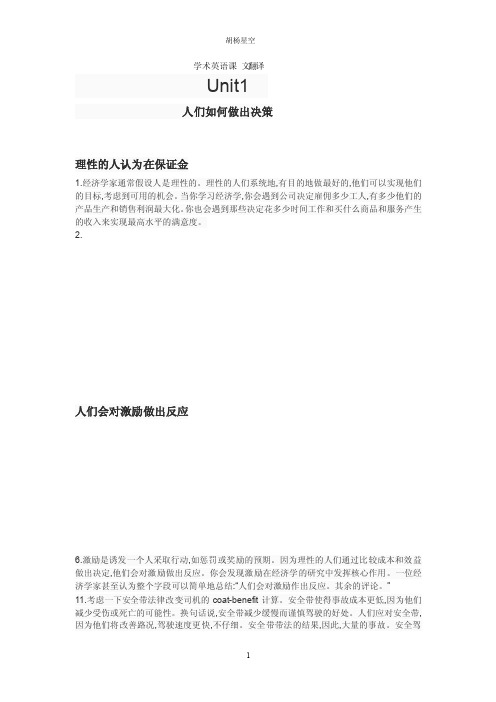
学术英语课文翻译Unit1人们如何做出决策理性的人认为在保证金1.经济学家通常假设人是理性的。
理性的人们系统地,有目的地做最好的,他们可以实现他们的目标,考虑到可用的机会。
当你学习经济学,你会遇到公司决定雇佣多少工人,有多少他们的产品生产和销售利润最大化。
你也会遇到那些决定花多少时间工作和买什么商品和服务产生的收入来实现最高水平的满意度。
2.人们会对激励做出反应6.激励是诱发一个人采取行动,如惩罚或奖励的预期。
因为理性的人们通过比较成本和效益做出决定,他们会对激励做出反应。
你会发现激励在经济学的研究中发挥核心作用。
一位经济学家甚至认为整个字段可以简单地总结:“人们会对激励作出反应。
其余的评论。
”11.考虑一下安全带法律改变司机的co at-benefi t计算。
安全带使得事故成本更低,因为他们减少受伤或死亡的可能性。
换句话说,安全带减少缓慢而谨慎驾驶的好处。
人们应对安全带,因为他们将改善路况,驾驶速度更快,不仔细。
安全带带法的结果,因此,大量的事故。
安全驾驶的下降有一个明确的,行人造成负面的影响,他们更有可能发现自己在一次事故中但(与驱动程序)没有添加保护的利益。
12.起初,这个讨论的激励和安全带似乎是闲置的猜测。
然而在1975年的一个经典研究,经济学家萨姆peltz nab汽车安全法认为,有许多这样的效果。
根据贝特兹曼的证据,这些法律产生了每次车祸的死亡事故。
他的结论是,最终的结果是小司机死亡人数的变化,增加行人死亡的数量。
13.peltma n对汽车安全的分析是一个另类的一般原则的例子,人们会对激励作出反应。
在分析任何政策时,我们必须考虑不仅直接影响还不太明显的间接影响,通过激励工作。
Unit2 Energy for Planet Earth 课文翻译
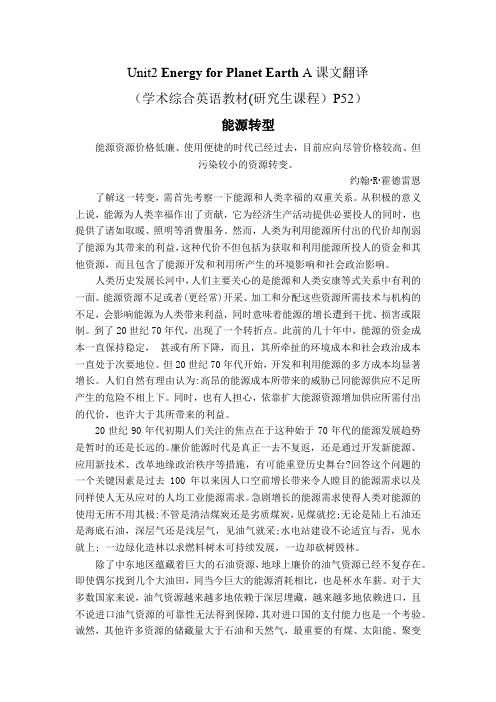
Unit2 Energy for Planet Earth A课文翻译(学术综合英语教材(研究生课程)P52)能源转型能源资源价格低廉、使用便捷的时代已经过去,目前应向尽管价格较高、但污染较小的资源转变。
约翰∙R∙霍德雷恩了解这一转变,需首先考察一下能源和人类幸福的双重关系。
从积极的意义上说,能源为人类幸福作出了贡献,它为经济生产活动提供必要投人的同时,也提供了诸如取暖、照明等消费服务。
然而,人类为利用能源所付出的代价却削弱了能源为其带来的利益,这种代价不但包括为获取和利用能源所投人的资金和其他资源,而且包含了能源开发和利用所产生的环境影响和社会政治影响。
人类历史发展长河中,人们主要关心的是能源和人类安康等式关系中有利的一面。
能源资源不足或者(更经常)开采、加工和分配这些资源所需技术与机构的不足,会影响能源为人类带来利益,同时意味着能源的增长遭到干扰、损害或限制。
到了20世纪70年代,出现了一个转折点。
此前的几十年中,能源的资金成本一直保持稳定,甚或有所下降,而且,其所牵扯的环境成本和社会政治成本一直处于次要地位。
但20世纪70年代开始,开发和利用能源的多方成本均显著增长。
人们自然有理由认为:高昂的能源成本所带来的威胁已同能源供应不足所产生的危险不相上下。
同时,也有人担心,依靠扩大能源资源增加供应所需付出的代价,也许大于其所带来的利益。
20世纪90年代初期人们关注的焦点在于这种始于70年代的能源发展趋势是暂时的还是长远的。
廉价能源时代是真正一去不复返,还是通过开发新能源、应用新技术、改革地缘政治秩序等措施,有可能重登历史舞台?回答这个问题的一个关键因素是过去100 年以来因人口空前增长带来令人瞠目的能源需求以及同样使人无从应对的人均工业能源需求。
急剧增长的能源需求使得人类对能源的使用无所不用其极:不管是清洁煤炭还是劣质煤炭,见煤就挖;无论是陆上石油还是海底石油,深层气还是浅层气,见油气就采;水电站建设不论适宜与否,见水就上; 一边绿化造林以求燃料树木可持续发展,一边却砍树毁林。
